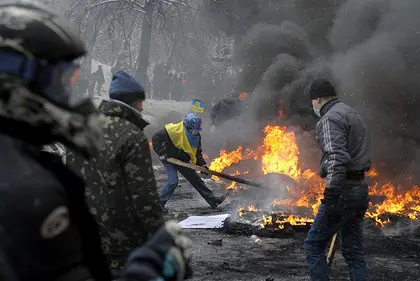Attempts were also made on the regional councils of Sumy, Ivano-Frankivsk, Zhytomyr and Vinnytsia, where demonstrations took place and where more are planned for noon on Jan. 24, according to media reports.
The events took place amid a tense political standoff in Kyiv where peace talks were in their second day between the president and three opposition leaders to end an escalating crisis that has seen the deaths of protesters. Afterward, Yanukovych condemned the takeover of public buildings.
JOIN US ON TELEGRAM
Follow our coverage of the war on the @Kyivpost_official.
A truce was in place between police and protesters until 8 p.m. who have clashed periodically since Jan. 19 after a package of draconian, freedom-crushing laws were enacted.
“Yanukovych is now going to have to make some difficult choices, but the crisis continues to lurch from one stress point to another,” wrote Timothy Ash in a note, head of research for Standard Bank in London. “Increasingly though it is evident that Yanukovych is struggling to present himself as a leader of all Ukraine, and all Ukrainians. It is too early to talk about ethnic conflict, and perhaps that it not a reality in Ukraine, but the fault lines are beginning to appear across Ukraine in what are clearly now very worrying developments.”
There have been no reports of large-scale protests in eastern Ukraine, however, where the electoral base of Yanukovych and his Party of Regions is located. In earlier statements made this week, Yanukovych emphasized his determination to keep Ukraine united and the need for an emergency parliamentary session to convene to help resolve the situation.
“You know that the riots that have occurred recently, were accompanied by violence, bloodshed, and arson. That is, the present situation requires immediate settlement,” the president told Parliament Speaker Volodymyr Rybak on television.
Parliament’s website already has a parliamentary session scheduled to take place on Jan. 28.
The measure, some political analysts believe, is a ploy to start state of emergency proceedings for a larger crackdown instead of a move to revoke the draconian laws passed on Jan. 16.
Taras Berezovets, head of Berta Communications, a political consultancy, told the Kyiv Post that “the procedure (for calling a state of emergency), is simple.”
“First, the president addresses the nation, which he did on Jan. 20. After two days, the government or national security council can ask that parliament consider a state of emergency. If passed by a majority, it can be introduced the following day.”
According to the political consultant, a nationwide state of emergency can be imposed for 30 days, a city-wide emergency can be imposed for 60 days.
Kyiv Post editor Mark Rachkevych can be reached at rachkevych@kyivpost.com.
You can also highlight the text and press Ctrl + Enter



